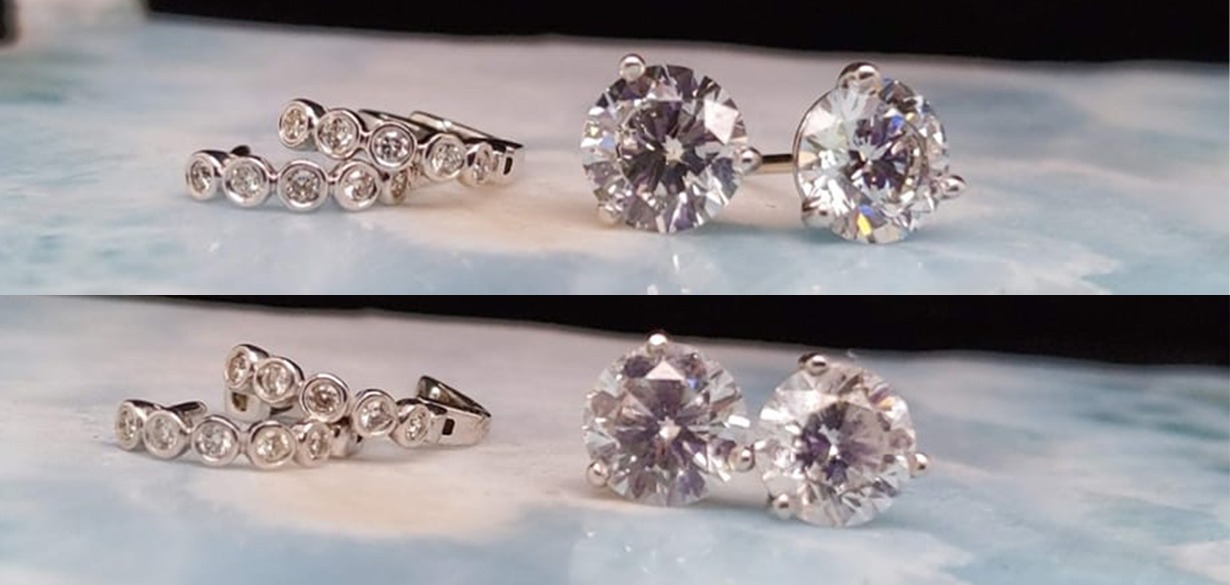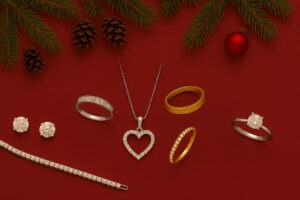Ask any jeweler and they can tell you a horror story when it comes to cleaning jewelry. Here at Hendrickson’s, we recommend getting your Jewelry professionally cleaned 2 times a year, AT LEAST! Jewelry is a statement that we wear daily. Just like your clothes, hair and car, it needs to be cleaned.
A Jewelry Cleaning Cautionary Tale
Here is a story from a fellow jewelry store: A sweet lady came in because the chain on her favorite necklace broke and she wanted it fixed. Looking at the hollow heart-shaped pendant, the jeweler could see dirt and grime on it. In fact, they could even see clumps of hair inside the locket. The jeweler took the necklace in a paper towel so they would not touch it, confirmed it was not a memory locket, and started to sanitize it. The full process of the cleaning and sanitation took two days. They first cleaned it for 2 hours in their ultrasonic cleaner, trying to shake and separate all the dirt from the Jewelry. After seeing that none of it had moved, they allowed it to soak for about 18 hours, then used a small metal rod to gently scrape and remove the gunk and hair from the locket. They continued to clean it for another day before they could properly repair any breaks, or replace stones that had fallen out years before.
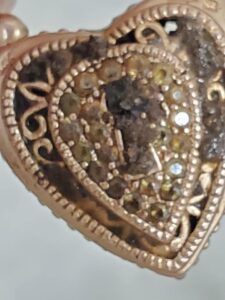
Before
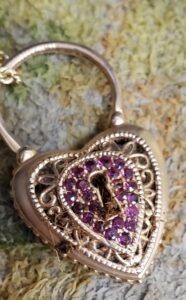
Before
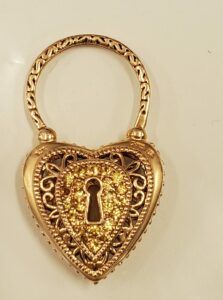
After
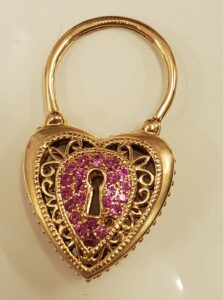
After
How We Clean Jewelry at Hendrickson's
When you bring your Jewelry into us to clean, we spend time inspecting it to see if there are any repairs we notice (at times some repairs are not evident until they’re completely cleaned). We then deposit diamond and sapphire stone jewelry that is gold or platinum into acid (silver and other gemstones that can’t go into the acid just go into the ultrasonic). This helps loosen dirt and grime and removes any organic material from the Jewelry. Once it has spent at least 5 minutes in the acid bath, we steam off the Jewelry and put it into the ultrasonic with our cleaning solution. This sanitizes the Jewelry and will shake off the remaining dirt and grime. Sometimes the Jewelry needs multiple rotations of ultrasonic and acid to clean it up. We clean all the Jewelry thoroughly before we work on it. This keeps us safe and ensures your Jewelry looks brand new.
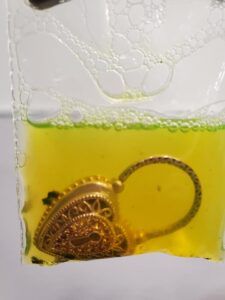
Jewelry Care and Maintenance
Proper care and maintenance are essential to keeping your Jewelry looking its best and ensuring its longevity. Different types of Jewelry require specific attention to maintain their beauty and functionality. As a general rule, Jewelry should be the last thing you put on when getting ready and the first thing you take off at the end of the day. This helps protect your pieces from exposure to perfumes, lotions, and other chemicals that can dull their shine or cause damage.
While regular at-home cleaning can help maintain the appearance of your Jewelry, it’s crucial to exercise caution. Dirt or grime may sometimes be holding a loose stone in place, and cleaning without proper inspection could cause the stone to become dislodged and lost. Additionally, avoid cleaning near open drains to prevent losing small pieces, and steer clear of using toothpaste, as it can scratch both stones and metal. To ensure your Jewelry stays in top condition, consider having it professionally inspected and cleaned, especially if you suspect any stones might be loose. With that in mind, here are some tips on how to care for different types of Jewelry.
Jewelry and Everyday Activities: What to Avoid
Your daily routine can have a significant impact on the condition of your Jewelry. Here are some common activities and substances to be mindful of:
- Lotions and Perfumes:
Lotions, perfumes, and other personal care products can leave residue on your Jewelry, dulling its shine and potentially causing discoloration over time. It's best to apply these products before wearing your Jewelry to minimize exposure. Additionally, some chemicals in these products can weaken the metal or damage the setting of your stones.
- Showers and Swimming:
It's advisable to remove your Jewelry before showering, swimming, or engaging in water-related activities. Chlorine in pools, saltwater, and even the chemicals in tap water can tarnish and damage certain metals, particularly silver and gold. Prolonged exposure to moisture can also lead to water spots or mineral buildup on gemstones and metals, diminishing their appearance.
- Exercise and Physical Activities
Remove your Jewelry before engaging in physical activities like exercise, gardening, or heavy lifting. Sweat can cause tarnishing, and physical impacts can lead to scratches, dents, or even breakage. Rings and bracelets are particularly vulnerable during such activities.
- Cooking and Cleaning:
Household cleaning products often contain harsh chemicals like bleach and ammonia, which can severely damage Jewelry. Cooking oils and food particles can also adhere to Jewelry, making it dirty and less appealing. Always remove your Jewelry before cleaning or cooking to protect it from damage.
Care Based on Jewelry Type
Your daily routine can have a significant impact on the condition of your Jewelry. Here are some common activities and substances to be mindful of:
- Rings:
Due to their constant exposure to hands and fingers, rings are prone to collecting dirt and oils. Regular cleaning with a soft brush and mild soap is recommended. Rings should be removed before activities like gardening, washing dishes, or heavy lifting to avoid damage.
- Necklaces
Necklaces are often exposed to body oils, perfumes, and lotions, which can dull their shine over time. Gently wipe necklaces with a soft, lint-free cloth after wearing,
- Bracelets:
Like rings, bracelets are exposed to a lot of wear and tear. They can easily collect dirt, especially in designs with grooves or stones. Regular gentle cleaning and occasional professional polishing will keep them looking their best.
- Earrings
Earrings are often overlooked but require regular cleaning as they are in direct contact with skin and hair, which can transfer oils and dirt. Clean earrings with a soft brush and mild soap, paying particular attention to the posts and backs. For earrings with gemstones or intricate designs, professional cleaning may be necessary to remove all dirt and buildup. It's also important to regularly check the backs and fastenings to ensure they are secure, especially for valuable or heavy earrings.
Care Based on Metal Type
- Gold:
Gold is a relatively soft metal that can scratch easily, so it's important to handle gold Jewelry carefully. Use mild soap and warm water to clean gold jewelry, and gently scrub with a soft toothbrush. Avoid harsh chemicals like chlorine, which can weaken the metal.
- Silver:
Silver tarnishes over time, especially when exposed to air and moisture. To clean silver, use a silver polishing cloth or a cleaning solution specifically designed for silver. Storing silver Jewelry in airtight containers or anti-tarnish pouches can help prevent tarnishing.
- Rose Gold:
Rose gold is prized for its warm, pinkish hue, achieved by alloying gold with copper. To clean rose gold, use a solution of warm water and mild soap, gently scrubbing with a soft-bristled toothbrush. Avoid harsh chemicals and abrasive cleaners that can damage the alloy and diminish the metal's color. Over time, the copper content in rose gold can cause it to darken or develop a patina. Keep rose gold away from moisture, perfumes, and lotions to minimize discoloration. Store rose gold jewelry in a soft pouch or lined jewelry box to protect it from scratches, and polish it occasionally with a soft cloth to maintain its shine.
- Platinum:
Platinum is a durable metal that can develop a patina over time. To clean platinum, use a mild soap and warm water solution, and scrub gently with a soft brush. Platinum can be polished to restore its original luster.
Care Based on Stone Type
- Diamonds:
Diamonds are extremely durable but can attract oils and dirt, dulling their sparkle. Clean diamonds regularly with a mild soap and water solution and gently scrub with a soft brush.
- Sapphires and Rubies:
Sapphires and rubies are also durable stones, but they should still be handled with care. Clean these stones with mild soap and water and avoid exposure to harsh chemicals.
- Emeralds:
Emeralds are softer and more prone to damage than diamonds, sapphires, or rubies. Clean emeralds gently with a soft cloth and warm, soapy water, and avoid ultrasonic or steam cleaners, which can cause fractures.
- Opals and Pearls:
Opals and pearls are very soft and porous, requiring special care. Clean them with a soft, damp cloth, and avoid using soap or cleaning solutions. Store opals and pearls separately from other Jewelry to prevent scratches.
- Turquoise and Other Soft Stones:
Stones like turquoise are sensitive to heat, chemicals, and even prolonged exposure to sunlight. Clean these stones with a soft, damp cloth and avoid abrasive or ultrasonic cleaning.
Care for Watches
Watches are not just timepieces; they are often valuable heirlooms or cherished accessories that require proper care:
- Mechanical Watches:
Mechanical watches, both manual and automatic, require regular maintenance to keep them functioning accurately. A professional watchmaker should service a mechanical watch every 3-5 years. Clean the exterior with a soft, lint-free cloth, and avoid exposing the watch to strong magnets, which can interfere with the movement.
- Quartz Watches:
Quartz watches are powered by a battery and generally require less maintenance than mechanical watches. The battery should be replaced every 1-2 years or when the watch shows signs of slowing down. Clean the exterior with a soft cloth, and ensure that the crown is fully pushed in or screwed down to maintain water resistance.
- Water-Resistant Watches
For water-resistant watches, especially those used for diving, it's important to regularly check the gaskets and seals to ensure they remain waterproof. After exposure to saltwater, rinse the watch in fresh water and dry it thoroughly.
- Smartwatches:
Clean the screen and case with a microfiber cloth to avoid scratches. Avoid exposing the watch to extreme temperatures, which can damage the electronics.
Storing Your Jewelry
Proper storage is just as crucial as regular cleaning when it comes to maintaining the beauty and longevity of your Jewelry. How you store your pieces can significantly impact their condition, preventing scratches, tarnishing, and other damage. Whether it’s a delicate necklace, a treasured ring, or a pair of earrings, ensuring that your Jewelry is stored correctly will help preserve its shine, integrity, and value for years to come. Below are some essential tips on how to store your Jewelry properly to keep it looking its best.
- Use a Jewelry Box:
A jewelry box with individual compartments is ideal for storing different pieces. The compartments prevent your Jewelry from tangling, scratching, or rubbing against each other, which can cause damage. Choose a jewelry box lined with soft fabric, such as velvet or felt, to further protect your items.
- Separate Different Metals and Gemstones:
Store different types of metals and gemstones separately to avoid chemical reactions that could cause tarnishing or discoloration. For example, silver should not be stored with gold, and softer gemstones like opals or pearls should be kept away from harder stones like diamonds, which could scratch them.
- Use Anti-Tarnish Strips:
For silver Jewelry, consider using anti-tarnish strips in your jewelry box or storage area. These strips absorb moisture and sulfur in the air, which can cause tarnishing, helping to keep your silver pieces looking bright and shiny.
- Keep Jewelry Dry:
Moisture can damage metals and gemstones, leading to tarnishing, rust, or mineral buildup. Always make sure your Jewelry is completely dry before storing it. If possible, store your Jewelry in a cool, dry place away from direct sunlight, which can cause fading and discoloration, especially for delicate stones like amethysts or opals.
- Use Soft Pouches for Travel:
Use soft pouches or travel cases designed for Jewelry. These pouches usually have separate compartments and padding to protect your pieces from damage during transport. For added security, consider wrapping delicate items in a soft cloth before placing them in the pouch.
- Avoid Hanging Necklaces:
While it may seem convenient, hanging necklaces can cause them to stretch over time due to the constant pull of gravity, especially for delicate chains. Instead, store necklaces flat in a jewelry box with individual compartments or in a soft-lined drawer. If tangling is a concern, lay them out separately or use a jewelry roll that keeps them secure without tension.
- Avoid Humid Environments:
If you live in a humid climate or if your storage area is prone to humidity, consider using silica gel packets in your jewelry box to absorb excess moisture. Humidity can accelerate tarnishing and other forms of damage, particularly for metals like silver.
- Keep Jewelry Out of Direct Sunlight:
Prolonged exposure to sunlight can cause certain gemstones to fade over time. To preserve the color and integrity of your stones, keep your jewelry box in a shaded area away from windows or direct sunlight.
By following these storage tips, you can help preserve the beauty and value of your Jewelry, ensuring that your cherished pieces remain in pristine condition for years to come.
Conclusion
Regular cleaning and proper care are essential for maintaining the beauty and longevity of your Jewelry. Whether white gold, silver, platinum, or a cherished gemstone, each piece requires specific attention to keep it looking its best. At Hendrickson’s, we’re here to help you care for your Jewelry, offering professional cleaning and inspections to ensure that your treasured items continue to shine. Bring your Jewelry in for a free cleaning and inspection at least two times a year, and let us help you preserve your most valuable pieces.
References and Additional Information
Jewelers of America “Jewelry Care”
American Gem Society “Jewelry & Gemstone Cleaning Methods to Use at Home”
American Gem Society “The Do’s and Don’ts of Cleaning Your Jewelry”
Jewelers Mutual “How to Clean Gold Jewelry the Right Way”
Jewelers Mutual “White Gold vs Silver: What You Need to Know”
Jewelers Mutual “Does White Gold Tarnish?”
Jewelers Mutual “Tips for Storing Jewelry”

